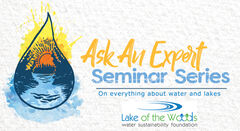
Over two hundred joined us this fall for a series of free “Ask An Expert” lunchtime webinars, as we study our watershed and learn how to protect our natural resource assets. Our lineup of experts had a wealth of knowledge and this was a great chance to connect directly with them.
Seminars consisted of an expert’s presentation followed by a Q&A opportunity.
October 12
12:00 p.m. CST
Dr. Cathy Eimers, Trent University
Nutrient Export in the Canadian Tributaries
Join Cathy Eimers to hear what she has discovered about the Canadian tributaries and what they are contributing to the nutrient loads into the Rainy River and Lake of the Woods.
October 19
12:00 p.m. CST
Jesse Anderson, Minnesota Pollution Control Agency
Minnesota’s Plan to Identify and Address Excess Phosphorus Pollution in Lake of the Woods and its Watershed, 1999-2021
Jesse Anderson is MPCA's lead scientist on water quality issues on the Rainy River and Lake of the Woods and has played a significant role in developing Minnesota's plan to reduce phosphorus loading. Join him for insight into what Minnesota's next steps are!
October 26
12:00 p.m. CST
Dr. Caren Binding, Environment and Climate Change Canada
Lake of the Woods from Space: Satellite Observations for Algal Bloom Monitoring
Join Caren Binding to learn about her research into monitoring algal blooms from space and how to gain access to watching bloom activity on Lake of the Woods yourself!
November 2
12:00 p.m. CST
Dr. Adam Heathcote, Science Museum of Minnesota
Lake of the Woods: A Story of Pollution, Recovery, and the Road Ahead
Delve into this fascinating history of Lake of the Woods with Adam Heathcote as he tells the story of polluted waters that have recovered in the most interesting ways!
November 9
12:00 p.m. CST
Dr. Scott Higgins, International Institute for Sustainable Development - Experimental Lakes Area
Climate Change and it’s Effects on Lake Ecosystems in Northwestern Ontario
Scott Higgins will provide insight into how our local environment is responding to climate change, based on his research at the Experimental Lakes Area, world reknown for its whole-ecosystem approach to science.
